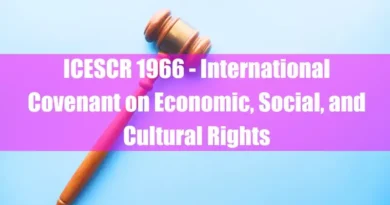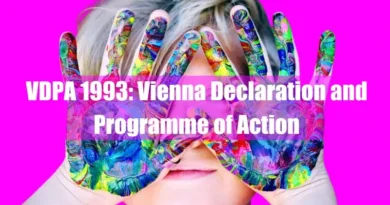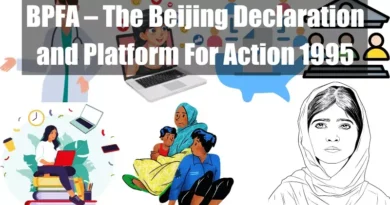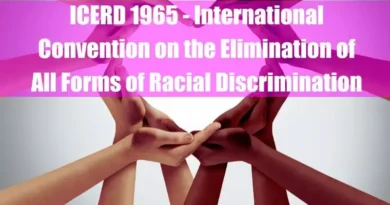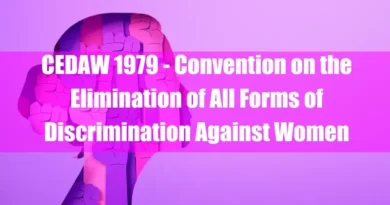UDHR – Universal Declaration of Human Rights (1948)
Takeaways
| Key Points |
|---|
| The Universal Declaration of Human Rights (UDHR), adopted in 1948 by the United Nations, serves as a global moral code to prevent future atrocities by enshrining fundamental rights for all individuals, regardless of background. |
| Though not legally binding, it has inspired numerous international treaties, constitutions, and advocacy efforts, emphasizing universality, non-discrimination, and inalienable rights as core principles. |
| Articles 3–21 detail civil and political rights, including the right to life, liberty, privacy, and equal protection under the law, while Articles 22–30 address economic, social, and cultural rights, such as access to education, work, social security, and cultural participation. |
| Despite challenges like political repression and poverty, the UDHR’s enduring framework continues to influence international law and advocacy, guiding governments to uphold dignity and equality. |
| Its vision persists in addressing modern issues like online privacy and AI ethics, reaffirming the relevance of universal human rights in evolving contexts. |
Introduction
The Universal Declaration of Human Rights (UDHR), adopted in 1948 by the United Nations General Assembly, emerged as a beacon of hope in the aftermath of World War II. It represents a universal moral code and a shared set of values aimed at preventing future atrocities by outlining fundamental rights for all individuals, regardless of background.
Although not legally binding, the UDHR has inspired numerous human rights treaties and national constitutions, serving as a foundational document for global progress. Its enduring influence continues to guide governments and activists in pursuing human dignity and universal rights.
Core Principles of the UDHR
The UDHR is founded on two core principles: universality, non-discrimination, and inalienable rights. These principles are essential for understanding the document’s scope and significance.
A. Universality and Non-Discrimination (Article 2)
Imagine a world where human rights are like exclusive club memberships, only available to a select few. The UDHR shatters this notion. Article 2 of the declaration proclaims that “everyone is entitled to all the rights and freedoms outlined in this Declaration, without distinction of any kind, such as race, color, sex, language, religion, political or another opinion, national or social origin, property, birth or another status.” This principle of universality is revolutionary.
This means that human rights are not privileges bestowed by governments but inherent entitlements that belong to every single person on Earth.
1. Universality: Rights for All, Everywhere
If you were born in a wealthy nation with a long history of democracy, you might take certain rights for granted, like the right to free speech or the right to vote. However, the UDHR reminds us these rights are not just for the fortunate few. They belong equally to everyone, regardless of their background or circumstances.
2. Non-Discrimination: Equality and Respect for All
The principle of non-discrimination is equally essential. It forbids discrimination based on any factor, ensuring that everyone has the same chance to enjoy their human rights. This means that a person’s race, gender, religion, or any other status cannot be used to justify denying them their fundamental rights.
B. Inalienable Rights (Article 3)
The UDHR goes beyond simply listing rights. It emphasizes that these rights are inalienable and cannot be taken away. Article 3 states that “everyone has the right to life, liberty and security of person.” These fundamental rights are inherent to our humanity, and no government or other entity has the authority to strip them away.
1. The Concept of Inalienable Rights: Intrinsic and Untouchable
Imagine a precious jewel, something irreplaceable and of immense value. That’s how the UDHR views inalienable rights. They are intrinsic to human beings, and no matter our circumstances, they cannot be rightfully removed.
2. Examples of Inalienable Rights in the UDHR
The UDHR lists a wide range of inalienable rights, including the right to life, freedom from torture, freedom of expression, and the right to education. These rights form the bedrock of a just and equitable society, where everyone has the opportunity to live with dignity and reach their full potential.
Understanding these core principles is crucial for appreciating the power of the UDHR. It is a document that champions the inherent dignity and equal worth of every human being, regardless of background or circumstance.
Civil and Political Rights (Articles 3-21)

The UDHR doesn’t just paint a broad picture of human rights; it dives into specifics.
A. Right to Life, Liberty, and Security of Person (Article 3)
The right to life might seem like a fundamental human right, but history is filled with examples of its violation. The UDHR places the right to life front and center, stating that everyone has the inherent right to exist and be protected from violence. This right extends beyond simply not being killed; it encompasses the right to live in safety and security.
B. Freedom from Torture and Cruel, Inhuman, or Degrading Treatment (Article 5)
Imagine a world where governments routinely torture their citizens to extract information or silence dissent. The UDHR emphatically prohibits such barbarity. Article 5 outlaws torture and cruel, inhuman, or degrading treatment, recognizing the inherent dignity of every person, even suspected criminals.
C. Right to Recognition as a Person Before the Law (Article 6)
Have you ever felt like you’re just a number in a system? The UDHR combats that feeling by guaranteeing the right to recognition as a person before the law. This means everyone is entitled to equal treatment under the law, regardless of their background or social status.
D. Equality Before the Law (Article 7)
The law is supposed to be blind, treating everyone equally. Article 7 reinforces this principle, proclaiming that everyone is equal before the law and entitled to equal protection. This means no one should be above the law, and everyone has the right to a fair trial.
E. Right to Liberty and Security of Person (Articles 8-11)
Imagine being thrown in jail without any charges or explanation. The UDHR safeguards against such arbitrary actions. Articles 8-11 establish a person’s right to liberty and security. This includes protection from arbitrary arrest, detention, or exile and the right to a fair and public hearing by a competent, impartial, and independent tribunal.
- Article 12: Right to Privacy: This article protects individuals from arbitrary interference with their privacy, family, home, and correspondence.
- Article 13: Freedom of Movement: This article guarantees freedom of movement within a country and the right to leave and return to one’s own country.
- Article 14: Right to Seek Asylum: This article protects individuals persecuted in their own country and allows them to seek asylum in other countries.
- Article 15: Right to Nationality: This article guarantees everyone the right to a nationality and prohibits states from arbitrarily depriving individuals of their nationality.
- Article 16: Right to Marriage and Family: This article recognizes the right of men and women to marry and start a family and guarantees equal rights in marriage.
- Article 17: Right to Property: This article protects the right to own property alone or in association with others.
- Article 18: Freedom of Thought, Conscience, and Religion: This article guarantees freedom of thought, conscience, and religion, including the freedom to change one’s religion or belief.
- Article 19: Freedom of Opinion and Expression: This article protects the right to hold opinions without interference and to seek, receive, and impart information and ideas through any media.
- Article 20: Freedom of Peaceful Assembly: This article guarantees the right to peaceful assembly and association.
- Article 21: Right to Participate in Government and Fair Elections: This article guarantees the right to participate in the government of one’s country directly or through freely chosen representatives. It also protects equal access to public service and the right to vote in genuine elections.
Economic, Social, and Cultural Rights (Articles 22-30)
The UDHR goes beyond just safeguarding basic freedoms. It recognizes that true human dignity hinges on a foundation of economic security and social well-being.
A. Right to Social Security and a Decent Standard of Living (Articles 22-23)
Imagine a world where many cannot afford necessities like food, shelter, and healthcare. The UDHR tackles this issue head-on. Articles 22 and 23 establish the right to social security and a decent standard of living. This means governments are responsible for creating conditions that allow everyone to meet their basic needs and live with dignity.
B. Right to Work and Just Working Conditions (Article 23)
Work is more than just a paycheck; it’s a source of dignity, purpose, and social connection. The UDHR recognizes this by enshrining the right to work and just working conditions. This includes the right to safe and fair working conditions, fair wages, and protection from exploitation.
C. Right to Education (Article 26)
Education is the key that unlocks a world of opportunity. The UDHR acknowledges this by proclaiming the right to education. This means everyone, regardless of background or income level, has the right to access quality education that equips them with the skills and knowledge they need to reach their full potential.
D. Right to Freely Participate in the Cultural Life of the Community (Article 27)
Culture is the tapestry of traditions, customs, and expressions that define a community. The UDHR recognizes the importance of cultural life by guaranteeing the right to participate in its life freely. This includes the right to enjoy one’s own culture and appreciate the cultural expressions of others.
E. Article 28: Right to a Fair and Just Social Order
This article emphasizes that the rights enshrined in the UDHR can only be fully realized within a just and fair social order. It implies a responsibility for governments to create conditions that enable individuals to enjoy their rights. This could involve social safety nets, access to education and healthcare, and a legal framework that upholds human rights principles.
F. Article 29: Duties to the Community
This article recognizes that individuals have responsibilities towards the communities they live in. These responsibilities stem from the rights and freedoms we enjoy. For example, freedom of expression comes with the responsibility to use it respectfully and not infringe upon the rights of others. Similarly, enjoying the benefits of society requires contributing to its well-being.
G. Article 30: Limitations on Rights
This article acknowledges that limitations on rights may be necessary under certain circumstances. However, these limitations can only be imposed as long as they are:
- Provided by law
- Necessary to protect the rights and freedoms of others
- Not used to destroy the core principles of the UDHR
These economic, social, and cultural rights are essential for creating a just and equitable society. While they may only be achievable in some contexts, the UDHR establishes a framework for governments to work towards, ensuring that everyone has the chance to live a dignified and fulfilling life.
Implementation and Enforcement
The UDHR is a powerful vision, but translating that vision into reality can be tricky. It’s not a legally binding treaty, meaning countries aren’t obligated to follow it to the letter.
A. The UDHR: A Non-Binding Instrument with Lasting Impact
Think of the UDHR as a moral compass guiding nations toward a world where human rights are respected. While it doesn’t have the legal force of a treaty, its influence is undeniable. The UDHR has inspired numerous human rights treaties and national constitutions, setting a global standard for human rights protection.
B. The Role of States in Upholding Human Rights
Individual countries have the primary responsibility for upholding human rights. Governments must create laws and policies that align with the principles enshrined in the UDHR. This means protecting civil liberties, ensuring social welfare, and promoting economic opportunities for all citizens.
C. International Mechanisms for Human Rights Promotion and Protection
The UDHR isn’t a solitary document. The United Nations has established various mechanisms to promote and protect human rights worldwide. These include human rights treaties with specific monitoring bodies and UN agencies dedicated to refugee protection and torture prevention.
International organizations like Amnesty International and Human Rights Watch also play a crucial role. These groups investigate human rights abuses, raise awareness of critical issues, and pressure governments to uphold their obligations.
D. Challenges and Opportunities
The road to a world where human rights are universally respected is long and winding. Conflicts, poverty, and political repression continue to be significant obstacles. However, the UDHR provides a robust framework for progress.
As new challenges emerge, like those surrounding online privacy and artificial intelligence, the UDHR’s core principles remain relevant, reminding us of the fundamental rights inherent to all human beings.
Conclusion
The UDHR is more than just a list of rights; it’s a powerful symbol of hope and a blueprint for a better future. Imagine a world where everyone can live with dignity and reach their full potential regardless of background or circumstance. The UDHR reminds us that this vision is not a utopia but a world we can strive to create.
The fight for human rights is an ongoing journey. There will be setbacks and challenges along the way. However, the UDHR is a constant reminder of the fundamental values that bind us: equality, respect, and the inherent dignity of every person.
By working together, raising our voices for justice, and holding our governments accountable, we can turn the promise of the UDHR into a reality for all. Let’s keep the spirit of the UDHR alive and work together to build a world where human rights are not just a dream but a lived experience.
FAQ
What is meant by “inalienable rights” in the context of the UDHR?
Inalienable rights are fundamental entitlements inherent to every individual by virtue of their humanity. These rights are intrinsic and cannot be surrendered, transferred, or revoked under any circumstances. The UDHR emphasizes that recognizing these rights is essential for the foundation of freedom, justice, and peace worldwide.
How does the UDHR define “human dignity”?
Human dignity refers to the intrinsic worth of every person, acknowledging that all individuals deserve respect and ethical treatment. The UDHR underscores that recognizing human dignity is crucial for achieving global freedom, justice, and peace.
What are “civil and political rights” as outlined in the UDHR?
Civil and political rights are protections and freedoms that safeguard individuals’ liberties and ensure their participation in the political sphere. The UDHR outlines these rights, including the right to life, liberty, security of person, freedom from torture, freedom of thought, conscience, religion, opinion, expression, peaceful assembly, and participation in government.
Can you explain “economic, social, and cultural rights” in the UDHR?
Economic, social, and cultural rights pertain to the conditions necessary for individuals to live with dignity and participate fully in society. The UDHR enshrines these rights, including the right to work, to just and favorable conditions of work, to social security, to an adequate standard of living, to health, to education, and to participate in cultural life.
What does “universal jurisdiction” mean concerning human rights violations?
Universal jurisdiction is a legal principle that allows states to prosecute individuals for serious crimes, such as genocide, war crimes, and crimes against humanity, regardless of where the crime was committed or the nationality of the perpetrators or victims. This principle ensures that perpetrators of grave human rights violations cannot escape justice by fleeing to another jurisdiction.
How does the UDHR address “non-refoulement”?
While the UDHR does not explicitly mention non-refoulement, this principle is fundamental in international refugee law. Non-refoulement prohibits returning individuals to countries where they face serious threats to their life or freedom, ensuring protection for those fleeing persecution.
What is the significance of “self-determination” in the UDHR?
Self-determination is the right of people to determine their political status and pursue their economic, social, and cultural development. Although not explicitly stated in the UDHR, this principle underpins many of its articles, emphasizing the importance of autonomy and freedom for all people.
Can you define “derogable” and “non-derogable rights” within the UDHR framework?
Derogable rights are those that can be suspended under specific circumstances, such as during a state of emergency. Non-derogable rights, however, are absolute and cannot be suspended under any conditions. The UDHR emphasizes the protection of fundamental rights, many of which are considered non-derogable, such as the right to life and freedom from torture.
What does “prohibition of torture” entail in the UDHR?
The UDHR explicitly prohibits torture and cruel, inhuman, or degrading treatment or punishment. This absolute prohibition underscores the commitment to human dignity and the protection of individuals from severe physical or mental pain inflicted intentionally.
How does the UDHR define “arbitrary arrest and detention”?
The UDHR asserts that no one shall be subjected to arbitrary arrest, detention, or exile. This means individuals cannot be deprived of their liberty without just cause and due process, protecting them from unjust or unlawful detention.
What is the “right to asylum” as per the UDHR?
The UDHR recognizes the right of individuals to seek and enjoy asylum from persecution in other countries. This provision ensures protection for those facing threats to their life, freedom, or well-being due to persecution.
Can you explain the term “freedom of thought, conscience, and religion” in the UDHR?
This right ensures that every individual has the freedom to think independently, hold personal beliefs, practice any religion or none, and change their religion or beliefs without interference. The UDHR emphasizes this freedom as fundamental to human dignity and autonomy.
What does “freedom of opinion and expression” mean in the UDHR?
The UDHR guarantees the right to hold opinions without interference and to seek, receive, and impart information and ideas through any media, regardless of frontiers. This encompasses freedom of speech, press, and access to information, essential for a democratic society.
How does the UDHR address “freedom of peaceful assembly and association”?
The UDHR ensures the right to peacefully assemble and associate with others, including forming and joining trade unions. This right is vital for collective action, advocacy, and the functioning of a pluralistic society.
What is the “right to participate in government,” according to the UDHR?
Article 21 of the Universal Declaration of Human Rights (UDHR) asserts that everyone has the right to participate in the governance of their country, either directly or through freely chosen representatives. This encompasses the right to vote and be elected in genuine periodic elections that reflect the people’s free will. Additionally, it ensures equal access to public service, emphasizing that governmental authority should derive from the people’s will.
This right is fundamental in empowering individuals and groups and is essential to eliminate marginalization and discrimination. Participation rights are inseparably linked to other human rights, such as the rights to peaceful assembly and association, freedom of opinion and expression, and the right to education and information.
By guaranteeing these rights, the UDHR promotes democratic governance, accountability, and transparency, ensuring that citizens have a say in decisions affecting their lives.
Reference
Universal Declaration of Human Rights – Amnesty International. (2023, December 11). Amnesty International. https://www.amnesty.org/en/what-we-do/universal-declaration-of-human-rights/





